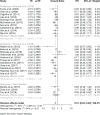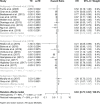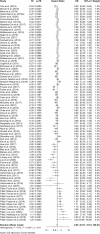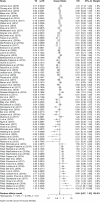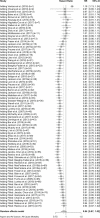Aspirin and cancer survival: a systematic review and meta-analyses of 118 observational studies of aspirin and 18 cancers
- PMID: 34567243
- PMCID: PMC8426031
- DOI: 10.3332/ecancer.2021.1258
Aspirin and cancer survival: a systematic review and meta-analyses of 118 observational studies of aspirin and 18 cancers
Abstract
Background: Despite the accumulation of research papers on aspirin and cancer, there is doubt as to whether or not aspirin is an acceptable and effective adjunct treatment of cancer. The results of several randomised trials are awaited, and these should give clear evidence on three common cancers: colon, breast and prostate. The biological effects of aspirin appear likely however to be of relevance to cancer generally, and to metastatic spread, rather than just to one or a few cancers, and there is already a lot of evidence, mainly from observational studies, on the association between aspirin and survival in a wide range of cancers.
Aims: In order to test the hypothesis that aspirin taking is associated with an increase in the survival of patients with cancer, we conducted a series of systematic literature searches to identify clinical studies of patients with cancer, some of whom took aspirin after having received a diagnosis of cancer.
Results: Three literature searches identified 118 published observational studies in patients with 18 different cancers. Eighty-one studies report on aspirin and cancer mortality and 63 studies report on all-cause mortality. Within a total of about a quarter of a million patients with cancer who reported taking aspirin, representing 20%-25% of the total cohort, we found aspirin to be associated with a reduction of about 20% in cancer deaths (pooled hazard ratio (HR): 0.79; 95% confidence intervals: 0.73, 0.84 in 70 reports and a pooled odds ratio (OR): 0.67; 0.45, 1.00 in 11 reports) with similar reductions in all-cause mortality (HR: 0.80; 0.74, 0.86 in 56 studies and OR: 0.57; 0.36, 0.89 in seven studies). The relative safety of aspirin taking was examined in the studies and the corresponding author of every paper was written to asking for additional information on bleeding. As expected, the frequency of bleeding increased in the patients taking aspirin, but fatal bleeding was rare and no author reported a significant excess in fatal bleeds associated with aspirin. No author mentioned cerebral bleeding in the patients they had followed.
Conclusions: There is a considerable body of evidence suggestive of about a 20% reduction in mortality in patients with cancer who take aspirin, and the benefit appears not to be restricted to one or a few cancers. Aspirin, therefore, appears to deserve serious consideration as an adjuvant treatment of cancer, and patients with cancer, and their carers, have a right to be informed of the available evidence.
Keywords: aspirin; bleeding; cancer; mortality; survival; thromboembolism.
© the authors; licensee ecancermedicalscience.
Conflict of interest statement
The author(s) declare that they have no conflict of interest. All the authors have read the paper and agree with its content.
Figures
References
-
- Lipton A, Scialla S, Harvey H, et al. Adjuvant antiplatelet therapy with aspirin in colorectal cancer. J Med. 1982;13:419–429. - PubMed
-
- Lebeau B, Chastang C, Muir JF, et al. No effect of an antiaggregant treatment with aspirin in small cell lung cancer treated with CCAVP16 chemotherapy. Results from a randomised clinical trial of 303 patients. Cancer. 1993;71:1741–1745. doi: 10.1002/1097-0142(19930301)71:5<1741::AID-CNCR2820710507>3.0.CO;2-Q. - DOI - PubMed
Publication types
LinkOut - more resources
Full Text Sources
Research Materials


